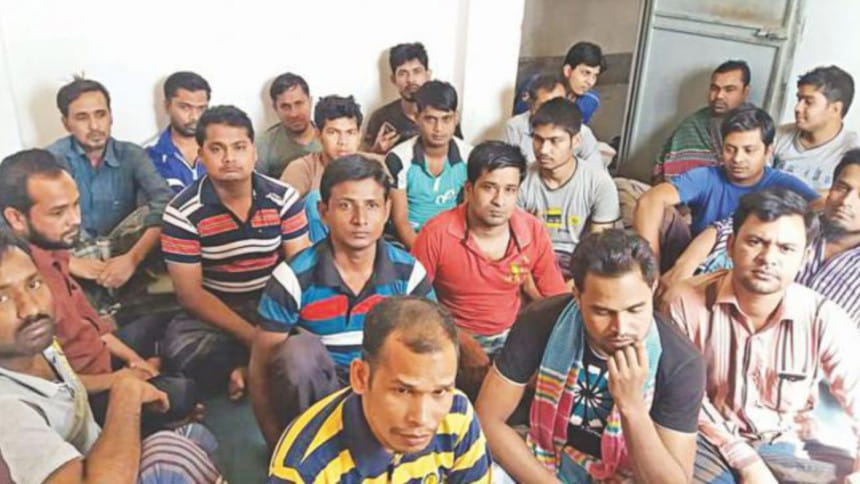The untold miseries of 25 Bangladeshis in Afghanistan

Foreign remittance is definitely contributing to the country's rising development in many areas. Today, every year around eight million Bangladeshis across the globe are remitting about USD 15 billion, which has gradually been boosting the country's economy. More than two-third of the total Bangladeshi migrants work in the Middle Eastern countries, namely, Saudi Arabia, the United Arab Emirates, Oman, Qatar, Bahrain, Lebanon, Jordan, Iraq and Libya. The rest of them are basically based in Western countries, namely, the UK, the US, Canada and Australia. In Southeast Asia, Bangladeshis are only aspiring to find jobs in Malaysia. Some Bangladeshis might seek work in other countries in the region. But when the name of Afghanistan, a war-torn country which has been almost ruined in the name of security and economy, recently came up in several print and electronic media as the destination country for 25 job seeking Bangladeshi workers, the rest of the country inevitably reacted with surprise and even concern.
The 25 Bangladesh, who used to work in different steel mills in Dhaka and Narayanganj before migrating to Afghanistan in October last year to work at Afghan Folad Steel Mill Co Ltd, have been living in miserable conditions. They have claimed that they have been stranded in a factory for over seven months without work and salary. Strapped for cash, they can hardly meet their daily needs, let alone sending money home. Some local workers at the factory help them manage food. They have been asked by the factory authorities not to leave the factory compound for security reasons.
The unfortunate and helpless Bangladeshis had left home for Afghanistan under the arrangement of an Indian national from West Bengal, who had pledged lucrative salary packages to the workers. They obtained manpower clearance from the Bureau of Manpower Employment and Training (BMET) under the Ministry of Expatriates' Welfare and Overseas Employment. This means that the manpower export of the country knowingly allowed its citizens to travel to one of the riskiest and most economically vulnerable country in the world, Afghanistan.
The country is now facing multiple problems from both inside and outside forcues. The emergence of militant groups Taliban, Al Qa'eda and some other groups are still carrying out their brutalities against innocent victims. And there is little hope that it can overcome the security and economy concerns any time soon.
Thus, we are struck by the question as to how the concerned authority, despite being aware of these threats of security, militancy and a vulnerable economy, permitted its nationals to go to Afghanistan for work. We could even view it in a positive light of foreign remittance, however, why then didn't the authority monitor the condition of these workers once they reached Afghanistan?
As there is currently no Bangladesh mission in Afghanistan, it could be argued that it would be very difficult to monitor the issue. But there is no scope of denying the fact that the concerned authority has failed to ensure the security of our people, who have been living in inhumane conditions, without pay or security.
Family members and relatives of these workers submitted a written complaint to the Afghan Embassy in Dhaka in April. They have also met the embassy officials and sought their help to bring back their dear ones. In the first week of this month, they met the embassy officials but the lack of any positive feedback has left them frustrated.
The Afghanistan Embassy in Dhaka also cannot deny its failures. They apparently were informed of the state of these captive workers in April – four months ago – and yet, failed to do anything about it. They should have immediately informed the matter to the Bangladesh Foreign Ministry. As far as we can tell, this has not been done.
An Afghan embassy official, however, claimed that they have been trying to resolve the problem by bringing the Bangladeshis back home and are also trying to realise their arrears. We can only hope that this problem is solved at the earliest.
An official of the Ministry of Expatriates' Welfare and Overseas Employment has said that they have recently been informed of the matter and "will look into matter". However, he also added that the Bangladeshi government usually does not encourage export of manpower to Afghanistan. We thus can't understand how the BMET issued this clearance. When we tried to reach the Bangladesh Foreign Ministry for comment, a senior official informed us that his office was not yet aware of the incident but the ministry would seriously look into the matter.
The family members of these workers are experiencing terrible hardship, as along with debilitating worry for their relatives, they don't even have enough money to run their daily expenditures. They had sent their male earning members abroad with the assurance of better pay and life for the whole family. Instead, they don't even have assurance of their relatives' security. The son of one of the workers informed The Daily Star that he gave up his graduate studies and took up a job to support his four-member family in the absence of his father.
The irresponsibility of the concerned Bangladeshi and Afghan authorities in this regard is unacceptable. We urge the governments of both these governments to look into the matter seriously and sincerely to resolve the issue as soon as possible.
The writer is a reporter of The Daily Star.

 For all latest news, follow The Daily Star's Google News channel.
For all latest news, follow The Daily Star's Google News channel. 






Comments